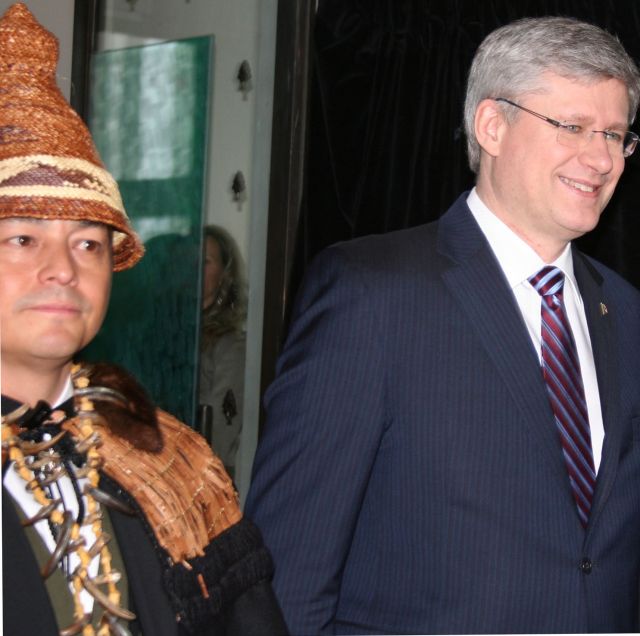OTTAWA - The historic Crown-First Nations Gathering revealed stark differences on how the relationship between Canada’s founding peoples and the government, embodied in the Indian Act, should continue.
And whatever is resolved, an advisor to the Catholic Church said, must re-affirm historic treaties signed between the two.
It is about recognizing the sacred importance of covenants, said Gerry Kelly at the one-day gathering held in Ottawa Jan. 24. Kelly is the former director of the Canadian Conference of Catholic Bishops’ secretariat on aboriginal affairs and now advises Catholic entities regarding the Indian Residential Schools legacy.
“Our whole understanding of our relationship with God is understood scripturally in terms of covenants,” said Kelly. “We understand what it means. A covenant is sacred. We can’t hold that position and not recognize the covenant relationship established by treaties. It is timeless and it is binding.”
Assembly of First Nations National Chief Shawn Atleo called the Indian Act “a breach” of the government’s commitment to First Nations peoples that was “built on a disgraceful premise of our inferiority.”
“It is well past time that we began to undo the damage that Act has inflicted on our peoples, and to our partnership,” Atleo said, noting it formed the basis for the reserve system, residential schools and prohibitions of spiritual and cultural practices.
Prime Minister Stephen Harper, however, promised an incremental approach to remedying some problems inherent in the Act, but bluntly stated his government had “no grand scheme to repeal or to unilaterally re-write the Indian Act.”
“After 136 years, that tree has deep roots. Blowing up the stump would just leave a big hole,” Harper told the more than 150 First Nations leaders at the gathering. “However, there are ways, creative ways, collaborative ways, ways that involve consultation between our government, the provinces and First Nations leadership and communities, ways that provide options within the Act, or outside of it, for practical, incremental and real change.”
The gathering was called to find ways to improve the relationship between Canada’s First Nations’ people and the federal government. It had been planned for some time, with the date finalized during the period in late 2011 when images of the poverty on Canada’s reserves were brought to the forefront with the poor housing conditions that plagued Attawapiskat in Northern Ontario.
Kelly said incremental approaches are not problematic in themselves.
“So much of this depends on good intentions and fairness,” he said. The challenge in the past has been with First Nations and bands being pressured “to give up their full rights for a limited parcel of rights.”
The other problems with an incremental approach are strictly practical, he said.
“The longer this process takes, the more resources are taken from First Nations lands in the context where their rights to resources and benefiting from those resources are ignored.”
Aboriginal entrepreneur and consultant David Acco, a Catholic and Montreal-based member of the Cree First Nation, said the gathering could not have taken place in the 1960s or ’70s with the kind of aboriginal inclusiveness of today. Aboriginal people have developed the leadership abilities and legal skills to put them in a better position to negotiate, he said.
Acco, president of Acosys Consulting, said a long-term vision is needed that takes into consideration how current negotiations will affect future generations.
“I don’t think aboriginal people are going to get another opportunity to right the wrongs of the past like we have now in another 100 years,” Acco said.
He also raised concerns about incremental approaches creating a hierarchy of “haves” and “have-nots” that will see some First Nations rewarded and others, like Attawapiskat, left behind. Communities like Attawapiskat need the Indian Act for their survival, Acco said, because of the fiduciary responsibility the Crown has to First Nations. An incremental approach decentralizes and potentially fragments any unity among First Nations, he said.
The gathering’s “outcome statement” affirmed principles in the Joint Action Plan the government and First Nations developed in June 2011 that included improving relationships and partnerships “respectful of aboriginal and treaty rights,” transparent and accountable governance, empowering success through education and opportunity, promoting self-sufficient communities and assisting economic development that will benefit all Canadians.
The statement called for immediate action on a renewed relationship that includes multi-year funding, improved financial accountability on the part of all with the goal of First Nations financial self-sufficiency. It affirmed an incremental approach to “removing barriers to First Nations governance,” by working around and through existing mechanisms in the Indian Act, which cannot be replaced overnight,”and committed both parties to “respect and honour our treaty relationship and advance approaches to find common ground on treaty implementation.”
Assembly of First Nations National Chief Shawn Atleo and Prime Minister Stephen Harper process into Crown-First Nations Gathering Jan. 24.
Photo by Deborah Gyapong
Crown, First Nations’ covenants must be retained
By Deborah Gyapong, Canadian Catholic News
Tagged under:
Please support The Catholic Register
Unlike many media companies, The Catholic Register has never charged readers for access to the news and information on our website. We want to keep our award-winning journalism as widely available as possible. But we need your help.
For more than 125 years, The Register has been a trusted source of faith-based journalism. By making even a small donation you help ensure our future as an important voice in the Catholic Church. If you support the mission of Catholic journalism, please donate today. Thank you.
DONATE

